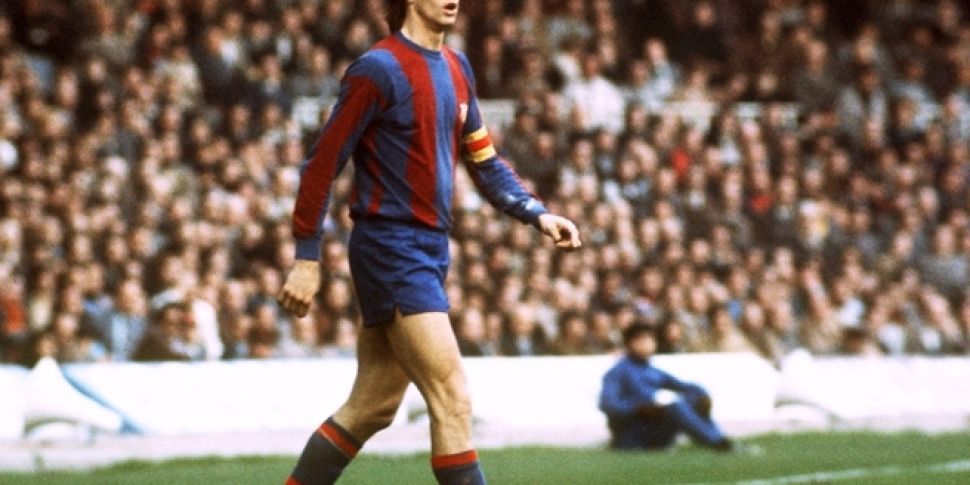With the passing away of Johan Cruyff who died, aged 68, on March 24th, after a long struggle against lung cancer, world football has lost one of its greats.
In terms of genius and influence and the sheer joy he brought to millions of fans, he is up there with Maradona and Messi, but with a greater cultural and political impact than either.
My colleague Simon Kuper put it well in his obituary in the Financial Times describing Cruyff as not merely the best footballer of the 1970s, but also someone who reinvented football. "It was as if he was the lightbulb and Thomas Edison in one," wrote Kuper.
Cruyff has spent the last few years officially retired from professional football, in and out of the limelight, but never far from the controversy he was happy to fuel for much of his adult life. He has been outspoken in the way that FC Barcelona has managed some of its affairs, not least whenever it picked managers that appeared to show disdain for his legacy.
For instance, he was critical at first when the club bought Neymar, predicting that he would not work well alongside Messi, and this would destabilise the team. He was proved wrong, and subsequently reconciled himself with a club that has been hugely generous towards him, not least in supporting his charitable sports foundation for kids.

The outpouring of genuine collective grief that followed his death was recognised by his son Jordi at a special memorial held at the Camp Nou: "On behalf of my mother, sisters and the rest of the family, I would like to say thank you for all the love, kind words and memories that have been shared with us since yesterday, but also over the past months. It has touched us deeply that Johan was such an inspiration to many of you".
Of the many positive memories cherished by football fans worldwide, few are as sweet as those heady days of the mid 1970s when the Dutchman, already a legend in his own country, created Barça’s ‘dream team’ - one of several as it would produce - thereby leaving an enduring legacy.
FC Barcelona has long prided itself in being ‘més que un club’, more than a sporting club, with a mythological political and cultural identity. Cruyff’s arrival in the capital of Catalonia in the summer of 1973, after being transferred from his Dutch club Ajax, proved a defining moment in Barça’s evolution as one of the most successful and universally popular sporting institutions in the world.
Before transferring to Barcelona, Cruyff as a player helped Ajax become the world’s best club team, as European champions from 1971 to 1973, and helped the Dutch national team reach the final of the 1974 World Cup where it lost to Germany 2-1, despite being the better side.

Cruyff helped raise Holland from sporting obscurity for a while into a widely respected exponent of the best of European soccer, inventing a new way of playing. Cruyff became the teacher of 'totaalvoetbal' [Total Football]. "His vision of perfect movement and harmony on the field was rooted in the same sublime ordering of space that one sees in the pictures of Vermeer or church painter Pieter Jansz Saebredam. It was the music of the spheres on grass,” wrote David Winner, the Dutch football historian.

Then in the summer of 1973 he signed a $1 million, three-year contract, with FC Barcelona - the highest amount ever paid at that time by the club for any player. After years of being humiliated by the memory of Real Madrid's ‘golden years’ and the continuing superiority of its rival, Barça, now with Michels as its coach, was ready for its own Di Stéfano, a player that could make a team great thanks to the influence of his personality and skill.
In his first season, 1973-74, Barça thrashed Real Madrid 5-0 at the Bernabeu before winning the League championship for the first time in 14 years. While they went on to win only a King’s Cup during his time as a player there, Cruyff is still remembered as the best player of the 1970s.
In Spain, as in Holland, he showed the attitude of a genius. His defiance of Franco’s laws against the use of the Catalan language, by registering his son with the Catalan name Jordi, came to symbolise a widespread sense of imminent liberation in the dying days of the old dictator.
But it was Cruyff’s second coming, when he signed up as Barça coach in May 1988, that ushered in a period of unprecedented football success at the club, also setting firm roots of organisation and style that would also help transform the underachieving Spain national team into European and World Champions.

Image: Mike Egerton / EMPICS Sport
Thanks to his 'dream team', Barça became champions of Europe for the first time in 1992. Over eight years, Barça won a total of eleven trophies including four Spanish league championships. The process eventually entered a new golden period under Pep Guardiola, a player turned coach who owed his inspiration to Cruyff. As Guardiola put it, "Cruyff built the Cathedral which others maintained and renovated".
Cruyff said of himself that I took him until he was thirty to understand why he did the things he did with the ball. He spent most of his life inspiring others with his philosophy of how football should be played: "I like positioning of the ball, I like attack, I like to see the team dominating the situation," Cruyff told me once. The 'other' game was basically "play the long ball, close it down, and take it from there. It’s a different approach but I think my way brings out individual skill".
He also put great emphasis on team spirit, and having a sense of collective identity. He came, after all, from Holland, a football country that had long fostered young talent. He focused on encouraging a new generation of young Barça players that were coming up through the club’s youth training programme, and mixing them with foreign stars. Such an initiative helped bring about a general resurgence of Spanish football on the global stage.
His legacy is the magical football played by Barcelona and the Spanish national team when at their best, as well as the the way Guardiola has extended that to German football during his time at Bayern Munich.
The lesson of the Cruyff years was that Barça could have foreigners and Spaniards (not just Catalans) in its team, some drawn from its exemplary youth academy La Masia, and still produce hugely entertaining football. Most importantly, they won titles playing in that style and enhanced the value of the club, commercially as well as culturally. Thanks to Cruyff , fans rediscovered why they were 'més que un club'.
Jimmy Burns is the author of Barça: A People’s Passion & La Roja
Download the brand new OffTheBall App in the Play Store & App Store right now! We've got you covered!
Subscribe to OffTheBall's YouTube channel for more videos, like us on Facebook or follow us on Twitter for the latest sporting news and content.








